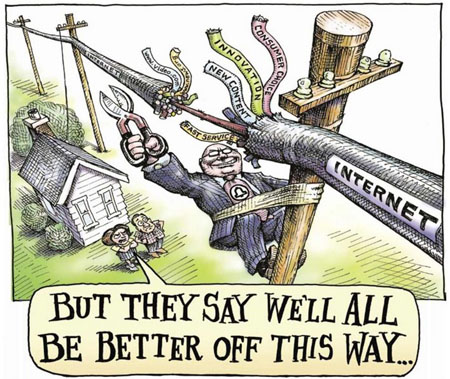Who Owns Cyberspace? (MSTU 4020; Week 3)
This week's reading discussed the implications of cyberspace on (and as) society and economy. I was particularly drawn to Dyson's et al. piece "Cyberspace and the American Dream: A Magna Carta for the Knowledge Age" and Webster's "The Information Society Revisited." Admittedly, I found myself distracted by the date on which these pieces were published, especially the Magna Carta piece (1994). How might these articles best relate to technological advances since 2009? We've discussed before the rapid changes in technology and how these changes almost certainly influence our social, cultural, economic, and political lives.
For the most part, the Magna Carta article came across as a melodramatic argument for technological determinism of cyberspace. Released in 1994, this "living document" constitutes a guide, (akin to The Constitution perhaps?), which encourages future readers to learn from and add to ideas about the impact of cyberspace on society. I'm not sure if or when this document was last updated, although I hope, for the sake of its purpose, that this document is still a work in progress.
However, one of the most notable quotes from the Magna Carta article came from a 1964 quote by libertarian Ayn Rand. It reads:
Government does not own cyberspace, the people do.
This quote immediately made me think about net neutrality. Sure, the government does not own cyberspace, but neither does, or should, corporations like Google and Verizon.
Net Neutrality Explained
It's interesting that Dyson's et al. piece talked about the idea of property rights in cyberspace since it appears like the founding mothers/fathers of this document didn't account for The Great Recession of 2010. Neither, perhaps, did they consider that the election of the first African-American president of the United States would ignite a fire storm within U.S. politics. Could they have ever imagined that conservative and libertarian media personalities like Glenn Beck would publicly condemn the president and his Administration as socialist for expanding broadband Internet access to poor and rural communities? Did the authors of this piece ever wonder about how the progressive left and far right would fight to the death about government regulation of the Internet? From a 1994 perspective, I can only imagine how easily it was to romanticize an open, neatly regulated, and "demassifyied" virtual landscape. Though in present-day reality, it seems as though cyberspace has turned into an even more contentious landscape.
The Young Turks Vs. Glenn Beck on Net Neutrality
If anything, the views expressed in the Magna Carta article could be best categorized as technological determinism. Tech advancements of cyberspace as a determining factor to the progress of our society as a whole does not necessarily signify a happy ending of a utopic society, but perhaps best functions as a starting point to a very long, exhausting, and controversial debate.
